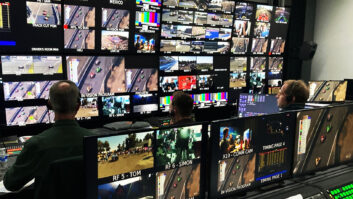
As head of International Video at the Associated Press, Sandy McIntyre (pictured) is well placed to express thoughts and opinions on the video news business for 2013. The major newsgathering organisation deals with its own online delivery via AP Video Hub, a live video service specifically designed to deal with people who – for a range of reasons – cannot deal with a satellite delivery. TVBEurope asked McIntyre to lay down his expectations for the year ahead. Where is TV going and what will the economy around it look like in the year to come?
MacIntyre: I think the outlook for TV is probably globally better in 2013 than it was in 2012. I think the explosion of channels globally will continue and that will help the overall economics
There are reasonably encouraging advertising figures in recent quarters in most of the media TV economies. I think the one dark spot on the horizon is the austerity packages that were handed down to state broadcasters or publically funded broadcasters by governments in light of the world recession.
But I think if you take the totality of it you will continue to see low single-digit growth in Europe and higher single-digit growth in TV globally. I think the digital TV world as viewed on your tablet, online or on your mobile will continue to show double-digit growth but it’s obviously a much lower base.
One of the interesting pieces of data that I’ve seen recently, specifically on the US market, was that more people are consuming video every hour of every day on a mobile device – be it tablet or phone – than they are online. I think if you were placing a bet on the future you’d place the bet on mobile video.
But the good news is that it’s additive rather than replacing online or TV. Video is actually reaching a wider audience and of course it’s reaching them at a time and a place of their choosing on a device of their choosing.
If you’re in the wholesale business – as AP is for news in the main – then that’s actually very good news. The golden key to the digital economy – in terms of the monetisation of online and specifically mobile – is still to be found. So from an economic point of view at the level of individual companies – as distinct from the macro level of the market – then I think that we’re all still scratching our heads as to how we turn that interest in news into digital dollars that we can bank. How will the consumption of news continue to change?
MacIntyre: I think at the end of the day the franchise for us will still be fast, accurate coverage of big breaking news and also big news that we break. I think what we’re seeing more and more when we look at our usage data is that people enjoy, appreciate and use the quirky and the whacky and the strange stories.
Their first life is a viral one and what we’re doing is adding value by taking that so-called UGC [user-generated content] and authenticating it. I think that’s an increasingly robust part of the market. I think the trends towards the celebrity end of entertainment and the consumption patterns going around that will continue. What’s the place of TV in the future of the media industry?
MacIntyre: Do not underestimate the human behavior that wants to gather around a television set as a community – whether that is at the level of a village in the developing world or a family in the developed world. I think that behavior will continue to drive massive viewership.
The more developed the country, then the more connected devices there will be in the room as the family is watching television. We shouldn’t forget that the consumption of television is actually about entertainment as well as information.
I think the broader economy of television is clear in that if you are going to commission a programme you want it to make money just by being shown on television. I don’t see that changing in 2013. That’s not to say that there won’t be a greater digital explosion of video but I do think that television for 2013 around that piece of the economy is still king. – Jake Young






